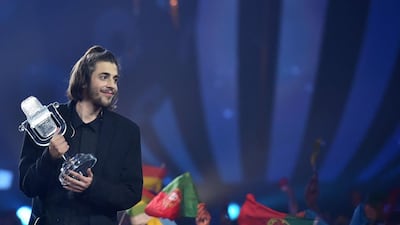Portugal won the Eurovision Song Contest for the first time on Saturday with a gentle, romantic ballad that challenged the event’s decades-long reputation for cheesy, glittery excess.
Salvador Sobral – who has a serious heart condition and is awaiting a transplant – sang Amar Pelos Dois (Love For Both), written by his sister Luisa, in a high, clear tenor accompanied by quiet strings and a piano.
Unlike the other 25 contestants who performed on a wide stage backed by flashing lights, bursts of flames and other effects, Sobral sang from a small elevated circle in the middle of the crowd, an intimate contrast to the bombast.
“Music is not fireworks, music is feeling,” the 27-year-old said as he accepted the award.
“I don’t know about national hero,” he said later, adding: “I think the real hero is [Portuguese footballer Cristiano] Ronaldo.
“I just wanted to sing a beautiful song as it is – it’s in Portuguese. If I can help to bring some change to music, I will be really joyful.”
Runner-up Kristian Kostov, of Bulgaria, was not short on feeling, either. The 17-year-old's power-ballad Beautiful Mess was awash in melodrama; the singer appearing almost wrung out by the romantic turmoil.
Moldova's SunStroke Project finished a surprising third, with a bouncy, jazzy song called Hey Mamma! that featured a clever stage routine in which the female back-up singers hid their microphones in bridal bouquets.
Francesco Gabbani of Italy had been the bookmakers’ favourite but ended up sixth, even though his act seemed the epitome of Eurovision’s cheerfully tacky aesthetics – singing a driving number about spirituality, accompanied by someone in a gorilla suit.
Romania came seventh with an unlikely combination of yodelling and rap, while Azerbaijan’s act in 14th place featured a man wearing a horse’s head on a stepladder.
Britain, which is experiencing a post-Brexit vote chill in European politics, did not fare much better here, with Lucie Jones, finishing 15th.
There was some controversy during a mid-show performance by last year’s winner, Jamala of Ukraine, when a man draped in an Australian flag jumped on stage beside her and bared his bottom to the audience before a security guard dragged him off the stage.
The annual celebration of catchy Europop, ludicrous costumes and glittering divas was hosted by Ukraine for the second time and was watched by about 200 million TV viewers.
Eurovision, now in its 62nd year, is intended as apolitical international entertainment. But the sweet intentions were soured this year when Russia’s participation was scuppered by host Ukraine over the nations’ diplomatic and military conflict.
Russia – one of Eurovision’s heavy hitters – is tied with Sweden for the most top-five finishes this century. This year’s contestant however, Yuliya Samoylova, was banned from competing by Ukraine because she had toured in Crimea after Russia’s 2014 annexation of the peninsula.
In response, Russia’s state-owned Channel 1 television refused to broadcast the contest.
The Moscow-Kiev split was a headache for Eurovision’s producer, the European Broadcasting Union, which strives to keep pop and politics separate. Overtly political flags and banners are banned and lyrics are monitored for provocative content.
In 2009, the EBU banned the Georgian entry We Don't Wanna Put In, a thinly-veiled dig at Russian president Vladimir Putin. The union, however, was criticised for not banning 1944 last year, allowing Russia-Ukraine tensions to fester.
The acrimony is ironic because Eurovision was founded in 1956 to bring European countries that had been at war a little over a decade earlier, together. It was launched a year before the founding of the European Economic Community, the forerunner of the European Union.
From its launch with seven countries, Eurovision has grown to include more than 40, including non-European nations such as Israel and, somewhat controversially, far-off Australia, where the event has a huge fan following.
The contest helped to launch the careers of Sweden's ABBA (victors in 1974 with Waterloo), Canada's Celine Dion (who won for Switzerland in 1988), and Irish dance show Riverdance, which provided the half-time entertainment in 1994.
* Associated Press, with additional reporting by AFP

